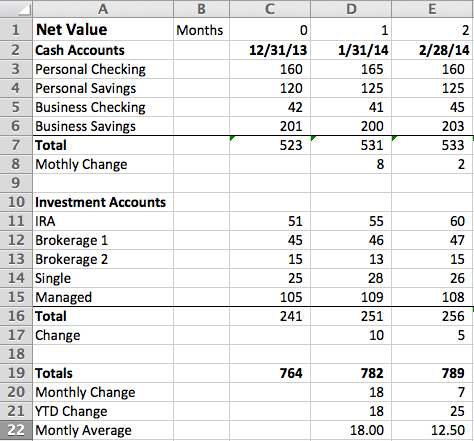Accounting: Answering The Key Question
I've been running a small business now for 18 years and I think I've finally settled on a simple way I like to answer the key question...are we making money and if so how much?
My business is incorporated, so I get paid as an employee and the business has a separate set of financials. I've always found it difficult to answer my own question of "how'd we do last month?" It kinda gets confusing because money flows in all different ways: regular paychecks, dividend withdrawals, profit sharing plans (retirement / investments aka my 401(k)) and other business perks / assets (healthcare, company car, etc, etc.). Sometimes the business checking will be way up, but the next month it'll be way down...but it's not necessarily down because of business expenses, maybe it was time for a scheduled investment withdrawal, or we made a transfer to a savings account, or...
So what I started doing is on the first of every month is I compile a list of all my "current cash and investment accounts." It's just a simple excel sheet that looks something like this:

It adds all of your cash accounts like checking and savings, personal as well as business. Then it adds all of your investment accounts. I always enter these numbers at the exact same time every month. I do mine early in the morning on the 1st of the month so I'm getting my cash account and investment numbers for the close of business at month end.
Now this might look pretty simple, but in the myriad of financial statements you can generate, this is a straight forward indicator of whether or not you're building wealth / value.
What about financial statements?
I have an accountant that gives me all sorts of valuable statements like an income statement, balance sheet, statement of cash flows, etc. Those are important, but one main problem is that my business and I are really one in the same. If I make a personal withdrawal from the business, my cash flow statement will show a deduction, but my personal account will show the addition. I want to know what's going on overall. It's a good idea to keep your business and personal accounting separate, but if you own a small business, you want some way to track an overall value. Not that it should, but as far as I'm aware, there's not any accounting software that will give you a snapshot across multiple companies / personal accounts.
Not representative of productivity
One thing to note is that this is not an indicator of productivity on the previous month. You might have a killer month, but not get paid for it until the following month. It's really about keeping track of added (or hopefully not reduced value) over the course of time.
Two indicators
I like seeing the monthly change in value, but the main two I look at are the YTD Change and the Monthly Average.
The YTD Change lets me know overall if I'm adding value to my net worth. Over the last 12 months, did I build value, maintain, or loose value?
The Monthly average let's me know on average how much extra cash (if any) I have available each month. It helps answer questions like: can we afford a new car payment, or can we increase our monthly retirement contribution or can we increase giving to our church? As a small business owner, your income is far from fixed, so answering those types of questions are difficult. This indicator gives you a little insight.
Summary
I hope that might help someone out there. This is definitely no substitute for real accounting software and/or an accountant, but it's a nice snapshot of where you're at and how much you've grown.
Here's the excel file if you want to download it and customize it for your own use. Let me know if you add anything to it or have other methods for your financial analysis.
